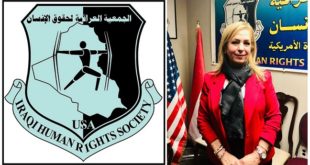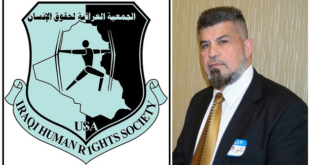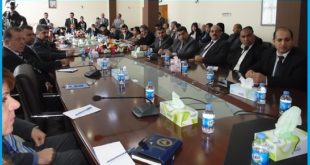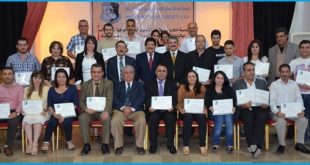The Iraqi Human Rights Society of the United States of America (IHRSUSA) was established in 1999 in Detroit, Michigan and has been active in many fields concerning human rights issues. IHRSUSA publishes a yearly report about the human rights condition in Iraq, focusing most importantly on the invasions, exploitations and the attacks that Iraqi citizens are faced with. They call upon the government and its officials to commit to the rules and laws regarding human rights.
IHRSUSA has held five official meetings, during which time new officials were elected to execute the organization’s duties. The first was in 1999, the second in 2000, the third in 2002, the fourth in 2004, and the fifth in 2006.
Many statements that oppose what Iraqis are exposed to are published by IHRSUSA. For example, the attacks against minorities such as the Christians, Sabean-Mandaeans (Suba), Yazidis, and Shebek; Turkey and Iran’s bombardment on Iraqi land; the organization’s commitment against terrorism and the assassinations of activists; and matters concerning the hijab (veil).
IHRSUSA offers assistance to new Iraqi refugees in America. In order to keep connected to Iraq and to create awareness around the world about the country’s current conditions, it hosts government officials and ministers to speak about and address these issues. The organization is an activist to other civil organizations and it holds public conferences to spread human rights education.
It has hosted the following people: Engineer Mrs. Wijdan M. Salim, minister of the Human Rights in Iraq; Mr.George Mansoue – Minister of Region Civil Affairs. ; Dr. Muhammed Ihssan, minister of the Human Rights in the Territory and Government of Kurdistan; Entifadh K. Qanbar – Spokesperson Iraqi National Congress. General Ahmad K . Ibrahim – Mission of Iraq to the United Nations.<Mrs. Pascale Warda – Minister of Migration and Displacment.<Mr. Najjar Shemdien, representative of the Kurdistan-Iraq Territory and Government in Washington; Mr. Nazar Heydar, director of the Iraqi Information Center in Washington; Dr. Abid Al Hussein Shea’ban, president of the Arabic Human Rights Organization; Army General Najieb Al-Saliehy Amien, general security of Active Majors and Free Civilians.
IHRSUSA meets with a number of government officials to discuss the conditions the Iraqi citizens and their continuous sufferings. It has met with the following people: Ambassador Richard Douny, American Council Coordinator with the Iraqi Opposition in 1999; Mrs. Rind Al Raheim, Iraq’s Iraqi Ambassador in Washington; Mr. Abid Al Kariem Al Basry, president of the Iraqi Sports Association, Dr. Ahmad Al Chalaby, vice president of the Iraqi Ministers in Washington during 2005; Yonadam Kanna – Republic of Iraq National Assembly Parliament in Toronto, Canada in 2005; Bishop Ibrahim Ibrahim, head of the Chaldean Parish in Detroit appeared Friday February 24, 2006; and the organization met with SAMIR Shakir M. Sumaidaie – Ambassador Extraordinary and Pienipotenntary Permanent Representative of Iraq to the United Nations. in March 2006.
The organization raised several points concerning the Iraqis’ human rights abroad and the fate of the refugees in various countries in which governments threaten their legal residency and their future existence. For example, our first concern is the refugees in Refha, Holland, and Germany. The group also talked about some Iraqis who are seized by the U.S. Government due to immigration or other problems.
On September 6, 2006 in Washington, D.C., Mr. Kareem Al Muasouy, representative of the High Committee of the Islamic, met with the organization. And they suggested several important factors, one of which was the militias which are causing most of the invasions and going against the law.
IHRSUSA gave the Iraqi media in Washington a detailed picture of its activities and public meetings in the United States, especially in the state of Michigan, in order to build a bridge between Iraqis in Iraq and those abroad. The following participated in this meeting: Mr. Nazar Haydar, president of the Iraqi Information Center in Washington; Dr. Adel Aouth, president of the Iraqi branch in SAWA Station; Announcer Mr Salem Mashkoor, director of the Iraqi branch in Freedom Station; Mr. Napoleon Beytho, president of the Alternative Assyrian Organization in Iraq in August 18, 2007; Mr. Andreas Youghna Athou, member of the Kurdistan Parliament; Mr. Nazaar Hanna, general manager of the Assyrian Teachings in the Territory of Kurdistan-Iraq in October 7, 2007; Mr. Ahmad Al Barak, president of the Royalty Controversy Board in Iraq in August 25, 2007.
In the north of Iraq, the organization met with the following: Mr. Serkies Ighajan, Economics Financial Minister, Mr.Muhammad Saleh, director of the 18th Branch of the Democratic Party Al-Kurdistany; Sheik Ali Al Mezoury, colonel of the Beiashmarga Forces in Dahuk city; Mr. Farancies Shabou Mindo and Mr. Boutrous Slyowa, representatives of the Christian Movement and Lieutenant Governor of Dahuk city; the Director of the provinces’ operations; the Security Director; the District Commissioner of Al Amadia; the director of the Political Prisoners Association.
IHRSUSA also presented to Seimak, an American organization currently in Dahuk a proposal to dig a number of water wells that is usable for drinking to 16 villages in Dahuk city. These villages include Araddin, Beynatha, Daoudia, Hais, Hermish, Badrish, Bey Ghitma, and other villages in need of drinkable water. The American organization agreed to this request.
In honor of the International Human Rights Day, a group from the Iraqi Human Rights Society in the United States of America met in December of 2006 with Dr. Hamid ALBayati – Ambassador Extraordinary and Pienipotentary Permanent Representative of Iraq to the United Nations.In the beginning of the meeting which took place at the Iraqi Delegation Center, Ambassador Al Beyaty welcomed the group and presented a detailed description of the special role of the delegation and Iraq’s place within the United Nations.
The organization raised several questions, some of which were… the current situation in Iraq, matters concerning human rights, and the subject of the Iraqi refugees that are spread in various countries throughout the world. Dr. Al Beyaty replied to every question and expressed the delegation’s willingness to defend each Iraqi refugee whose situation and rights are endangered inside the hosted country.
The group also visited Oula, the American Human Rights Society, and they spoke about their ability to help, reach and make progress towards the necessary services associated with the human rights and the establishment of discussion panels and the participation in educational institutions both in Iraq and America.
IHRSUSA participated with many conferences: the Peace Conference in Washington/ Hawaii, from 2007 to 2008; the Iraqi-American Conference in Michigan from 2002 to 2004; the Human Rights Conference in Canada in 2000; the People’s Freedom and Education Conference made by the American public society in April 2006; the Iraqi Human Rights Society in Germany in 1999.
The organization joined in several demonstrations and sit-downs, some of which they sat in front of the White House in Washington against the threats and the interference of Turkey in Iraq’s business on April 11, 2007; the public peace demonstrations formed by the Iraqi community in Windsor, Canada that protested the invasion and attacks against the Christian people in Iraq and took place on June 10, 2007; the protest in Toronto, Canada on June 17, 2007; IHRSUSA also played an active role in getting the Iraqi community to march in Southfield, Michigan (USA) in a protest that was hosted by another organization on June 30, 2006.
IHRSUSA was involved in various other demonstrations; one opposed the cowardice and bloody terrorist acts that affected the children of the new Baghdad and other areas; another which was held by the Iraqi community in Dearborn, Michigan (USA) on July 23, 2005; one took place in January 2005; one was in opposition to the deprivation of some of the Chaldean-Assyrians in Iraq from being involved in the Iraqi elections – of which the organization requested the Iraqi government to fix this discrimination in the future; 2001 – in front of the Iraqi Embassy in Washington, against the politics of Saddam; September 24 and 25, Iraqi-Americans and Iraqi-British demonstrated in New York in front of the United Nations.
The organization also met one year alongside the Security Committee, requesting from its members to lift the sanctions off the Iraqi citizens and to present Saddam’s barbaric ways to the international courts as a war criminal. It also did 688 reports in order to protect the civilians of Iraq.
 الجمعية العراقية لحقوق الأنسان في الولايات المتحدة الأمريكية الجمعية العراقية لحقوق الأنسان في الولايات المتحدة الأمريكية
الجمعية العراقية لحقوق الأنسان في الولايات المتحدة الأمريكية الجمعية العراقية لحقوق الأنسان في الولايات المتحدة الأمريكية



